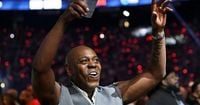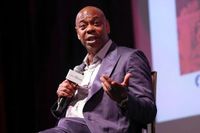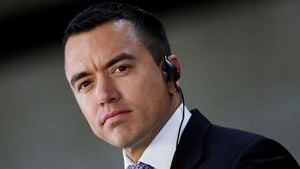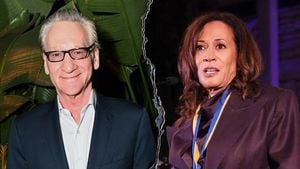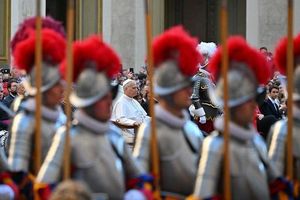Dave Chappelle, never one to shy away from controversy, found himself at the center of a global debate this week after his remarks about free speech during a set at the Riyadh Comedy Festival in Saudi Arabia. The festival, which ran from September 26 to October 9, 2025, drew more than 50 of the world’s top comedians and packed audiences of up to 6,000 people each night—including, remarkably, members of the Saudi royal family.
Chappelle’s comments, delivered on October 2, 2025, quickly ricocheted across social media and news outlets worldwide. The line that set off the firestorm? “It’s easier to talk here than it is in America.” According to The New York Times, the joke landed to a cheering crowd, but it also ignited immediate outrage and fierce debate about the meaning and limits of free speech, especially when performed inside a country widely criticized for its harsh restrictions on expression.
During his set, Chappelle riffed on the differences between American and Saudi approaches to speech, referencing the recent assassination of Charlie Kirk and the phenomenon of cancel culture in the U.S. “Right now in America, they say that if you talk about Charlie Kirk, that you’ll get canceled,” he said, pausing for effect. “I don’t know if that’s true, but I’m gonna find out.” Then came the line that would echo far beyond the festival: “It’s easier to talk here than it is in America.”
But Chappelle didn’t stop there. In a moment that seemed both tongue-in-cheek and loaded with subtext, he joked that he would use the phrase “I stand with Israel” as a coded message to alert fans if he was ever being censored. According to Haaretz, this quip added another layer to the already charged atmosphere, with critics and supporters alike parsing its meaning.
The Riyadh Comedy Festival itself had become a cultural flashpoint even before it began, as advocacy groups and fans questioned the ethics of performing in a nation with a track record of silencing dissent. The timing only intensified scrutiny: the festival overlapped with the anniversary of journalist Jamal Khashoggi’s murder, which human rights organizations—including Human Rights Watch—have repeatedly tied to Saudi government repression. For many observers, the juxtaposition was impossible to ignore.
Chappelle was hardly the only big name to take the stage. The roster included Bill Burr, Jessica Kirson, Jimmy Carr, and Kevin Hart, among others. Hart, for his part, praised the country from the stage, declaring, “I love what y’all are doing here. I’ll continue being a positive ambassador of your change to the world.” His remarks, reported by The Spectator World, drew their own share of eye rolls and criticism, but it was Chappelle’s reputation as a boundary-pushing social commentator that made his appearance—and his jokes—feel especially significant.
Yet, as The Spectator World detailed, participation in the festival came with strings attached. Every performer signed a contract explicitly forbidding any material that could “degrade, defame, or bring into public disrepute…The Kingdom of Saudi Arabia, including its leadership, public figures, culture, or people; the Saudi royal family, legal system, or government; and any religion, religious tradition, religious figure, or religious practice.” In other words, the very topics that have made Chappelle’s comedy so potent—political hypocrisy, government overreach, and the defense of free speech—were strictly off-limits when it came to Saudi Arabia itself.
For critics, the irony was glaring. Here was a comedian famous for skewering sacred cows and defending the right to offend, standing on stage in a country where dissent can be met with prison—or worse—while claiming it was “easier to talk” there than in the United States. “The problem isn’t accepting the money. Plenty of artists and performers and businesses have done the same,” wrote one commentator in The Spectator World. “The problem is signing away the whole reason your comedy became popular in the first place.”
The reaction online was immediate and polarized. Some fans cheered Chappelle’s willingness to test the limits of what could be said, even in a tightly controlled environment. Others accused him of helping to normalize a regime accused of egregious human rights abuses. Social media metrics, as reported by CNN and Deadline, showed that sharing of the joke spiked the day after the performance, with clips and commentary fueling a global conversation about the responsibilities of artists who perform in authoritarian countries.
Human rights groups, including Human Rights Watch, called the festival a form of “cultural whitewashing,” arguing that Saudi Arabia’s investments in sports and entertainment are part of a broader effort to launder its international reputation. Festival organizers, meanwhile, insisted that audiences simply wanted to laugh and that humor could cross borders—even if it meant avoiding certain topics.
For some attendees, the experience was unexpected. Abdulrahman Mohammad, a 23-year-old in the audience, told The New York Times that it was “so interesting to hear political jokes targeting Trump and Charlie Kirk” in Riyadh. He found it “surprising to hear him talk about it in Riyadh. When just recently America canceled Jimmy Kimmel doing the same.”
Yet the restrictions were clear: jokes about the Saudi royal family, government, or religion were strictly forbidden. As Suggest pointed out, “The threat of being ‘cancelled’ is a lot less harsh than being executed, however. At least you can make those jokes in America.” The implication was hard to miss—Chappelle and his peers could lampoon American politics all they wanted, but the real taboos remained untouched.
The fallout from Chappelle’s remarks could reshape comedy bookings and reputations for years to come. Promoters, agents, and performers now face a new calculus: the lure of big paydays overseas versus the risk of reputational damage at home. For fans, the episode raises thorny questions—should art be separated from politics, or should performers be held accountable for the platforms they choose?
As the dust settles, one thing is clear: in 2025, a single punchline can become a global flashpoint, forcing artists, audiences, and entire industries to reckon with the complicated relationship between comedy, commerce, and conscience.
